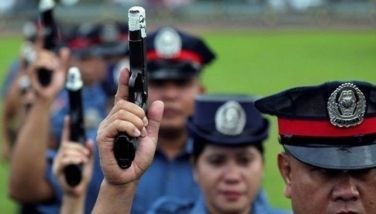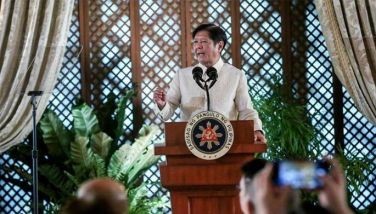Pasumbingay
CEBU, Philippines - Literary historian and scholar Resil Mojares was asked several years ago by national artist Virgilio Almario (acknowledged high priest of modern Tagalog poetry): “So where is the new Cebuano poetry?”
Mojares assured him there was a great deal of fresh, exciting work among contemporary writers in Cebuano but that he knew this was not exactly what Almario meant. He felt that if indeed such writing existed, it has not as yet acquired a visibility, a voice, a presence in the national scene.
Mojares finds that there is, of course, a bias in Almario’s question, intending as it did the complaint (and challenge) that Cebuano poetry is not visible to Tagalogs – those who, he described to be, by virtue of law and location, write in a privileged language, imagine themselves creators of the “national discourse,” enjoy greater access to the resources and rewards of writing (publishing, awards, exposure, recognition) and all the other advantages that invest those who write in the center with the aura of the “national” and mark everyone else as merely “local” or “regional.”
An already familiar lament he would not rehearse, he said in the foreword of the “Pasumbingay (Antolohiya sa Sugbuanong Balak).”
“The future of Cebuano poetry lies with its poets,” he said.
That the imperative is for Cebuano poetry to make itself heard, first in the community that speaks the language and then the other communities into which it enters by force of reputation or virtue of translation.
He added that “what this requires is not easy. Conditions of production, publishing, and promotion need to be improved and that a culture of criticism must be encouraged.”
Yet, he further said, at the core of this effort, is writing itself, both of the individual writer as well as that group of community of writers to which he or she belongs – writing that presents itself as aesthetically and critically different and, therefore, writing that can be ignored only to the diminution of the substance of that “republic of letters” we call Filipino literature.
Pasumbingay – which samples the writings of some of the best and most promising poets in Cebuano today – lays claim on the privilege as well as necessity to be heard.
“We should have more books of this kind,” he said.
Pasumbingay is a gathering of fresh voices and new poems by the members of the Bathalan-ong Halad sa Dagang literary group: (in alphabetical order) Temistokles “Tem” Mangila Adlawan, Melquiadito Maambong Allego, Vicente Vivencio “Butch” Bandillo, Maria Victoria “Bambi” Beltran, Jona Bering, Josua Cabrera, Lamberto “Nyor Lam” Ceballos, Vince Cinches, Adonis Durado, Richel Dorotan, Gregory Fernandez, Chai Fonacer, Anthony Kintanar, Kevin Lagunda, Ernesto Lariosa, Neile Genica Mijares, Michael “Myke” Obenieta, Hi-D Palapar, Karla Quimsing, Bal Marsius Valdehueza, Kareen Kristeen Valmoria, Cindy Velasquez, Noel Villaflor, Januar Yap, and Dr. Hope Yu.
Adlawan is a BATHALAD Hall of Famer in the field of fiction after competing and winning the top prize five times. He is a Pambansang Alagad ni Balagtas awardee, a prize given to distinguished Filipino writers by the Unyon ng Manunulat ng Pilipinas. Allego is a writer and a doctor of medicine based in the USA and is one of the founders of BATHALAD, Inc. as well as an active contributor in Kabisdak, a Web site showcasing Cebuano poetry. As for Bandillo, he is currently the Philippine Consul General of Palau after serving consular posts in the United Arab Emirates and in Germany. He is considered as one of the fathers of modern Cebuano poetry; while Beltran is a poet, fictionist and essayist who won the Gawad Komisyon for fiction in 2007 and 2008.
Bering joined the Cornelio Faigao Workshop in 2008 and has churned Cebuano and English poetry and fiction since her high school days. She was awarded “The Most Promising Writer” by Bisaya Magazine in 2009; Cabrera bagged the third prize in the Palanca Awards for Cebuano fiction in 2005; Ceballos has won numerous awards for his fiction and poetry – the latest is from the Carlos Palanca Foundation for Cebuano fiction; while Cinches developed his Cebuano poetry during his stint in Today’s Carolinian.
Durado, recipient of the Emmanuel Lacaba Prize, is the author of poetry collections Dili Tanang Matagak Mahagbong and Minugbo Alang sa Mugbo og Kalipay (2009) and received the “Best New Writer Award” from the Cebuano Studies Center and Faigao Foundation; Dorotan (known by his pen name Omar Khalid) is currently the literary editor of Bisaya Magazine; Fernandez writes poetry and fiction reflecting the Cebuano experience; while Fonacier writes freelance for magazines and dabbles in performance art.
Kintanar is rediscovering roots in Cebuano, being an avid reader of Bisaya in his childhood; Lagunda was named “The Most Promising Writer” by BisMag in 2008; Lariosa is former BATHALAD president who recently won Gawad Komisyon and Palanca awards for fiction and is considered as one of the influences in modern Cebuano writing; Mijares aspires to write poems echoing women’s cause. She is a fellow of Faigao Writers Workshop and the University of the Philippines Visayas Cebu College Creative Writing Workshop; Obenieta is a prize-winning poet in both English and Cebuano and is also the moderator of Kabisdak, a literary site for creative writers in Cebuano here and abroad; while Palapar mainly writes poetry but also writes heritage and art articles for local newspapers.
Quimsing is an Ilongga who started writing poetry in Filipino. When she moved to Cebu City to pursue graduate studies in literature, she was challenged and inspired to appreciate and celebrate the poetry of the Visayan tongues. Valdehueza was a fellow of the 25th Don Cornelio Faigao Memorial Workshop. Valmoria ventured into writing Cebuano poetry in 2007 under the influence of literary-minded friends; Velasquez feels she’s full of life every time she finishes writing a poem. Now she is a faculty member of the Department of Languages and Literature at the University of San Carlos; while Villaflor was named a fellow of the Faigao Writers Workshop and Silliman National Writers Workshop in 2000.
As for Yap, he was a recipient of the NCCA Ubod New Writers Series grant for his collection of short fiction – Ang Aktibistang Gi-syphilis ug Uban pang mga Sugilanon. His short story Ang Suhito won in the Palanca Awards; while Dr. Yu who has a Bachelor of Arts degree in English major in Applied Linguistics from the USC, a Master of Arts in English from the University of Calgary and a doctorate degree in Comparative Literature from UP-Diliman is currently an associate professor at the USC where she teaches both undergraduate and graduate classes.
Their works offer proof that the state of Cebuano poetry is very much alive and kicking. These 23 poets included in the anthology consist of three generations of Cebuano poets – the old guards, virtuosos, and future torch bearers.
Moreover, it was learned that “Pasumbingay” does not have an equivalent word in English. It can be translated as parable, allegory, fable or apologue, depending on the context. It can even be any literal or rhetorical device (metaphor, metonomy, synecdoche, irony) that consists in the use of words other than their literal sense. All poems are therefore made up of “pasumbingay.”
The book is published by BATHALAD, Inc. through a grant from the National Commission for Culture and the Arts. Copies, on paperback, are available at Kukuk’s Nest (near the junction of Gorordo Avenue and Escario Street/Extension) for P300. ?
- Latest
- Trending



















